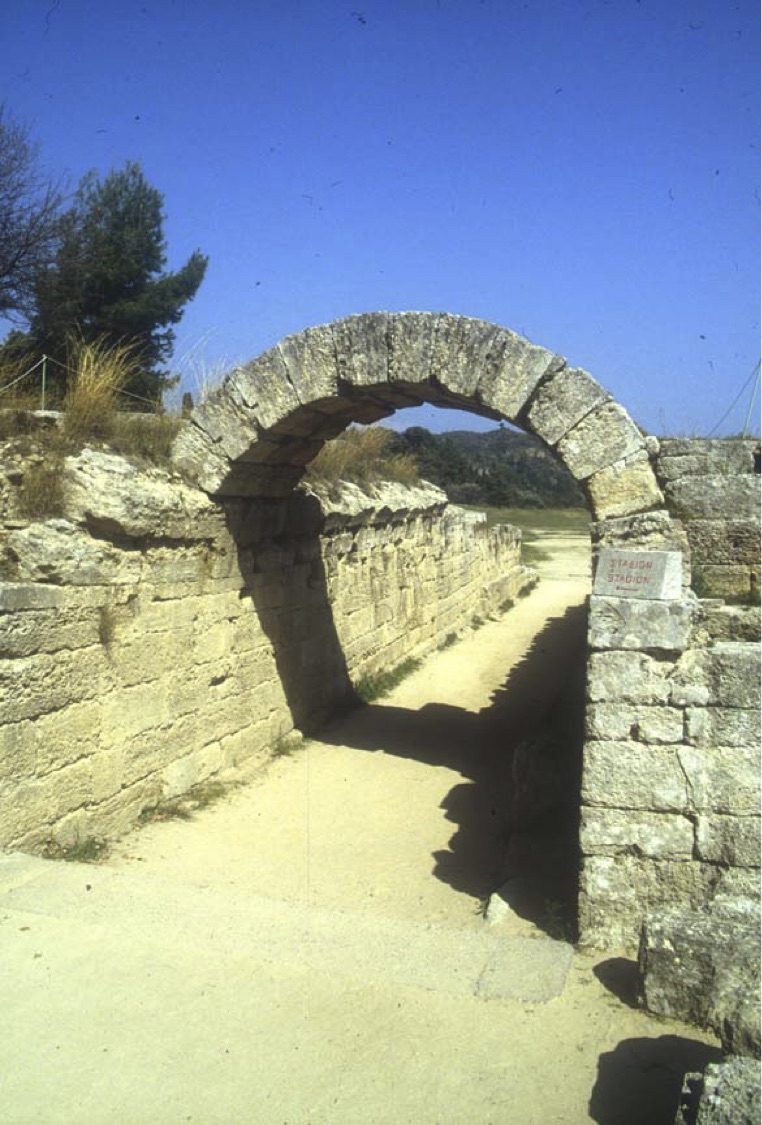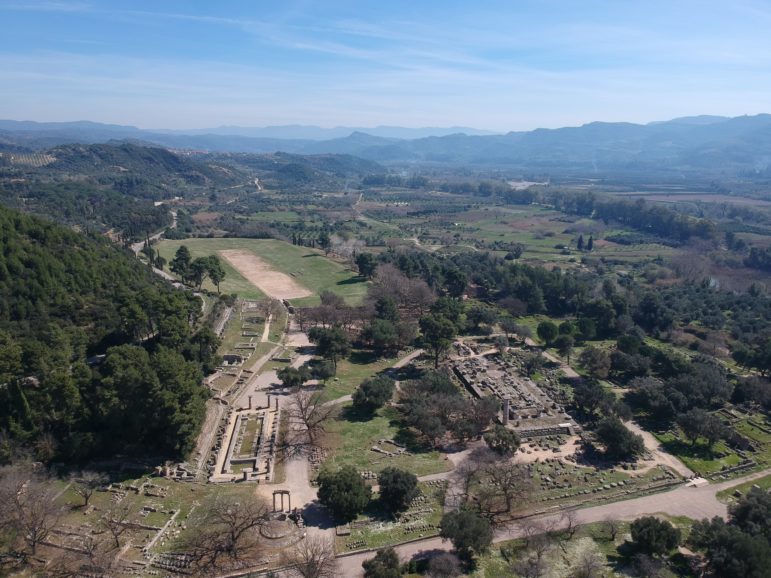This is the second of a two-part series on the ancient Olympics.
TWH – For 12 centuries, the ancient Greeks produced the ancient Olympic Games at the rural town of Olympia. A four-year interval, called an Olympiad, separated each game. These games held such importance for the Greeks that their historians used Olympiads to date specific events.
The first recorded game occurred in 776 B.C.E. No consensus exits among historians about whether the games began earlier. The Penn Museum reported that they may have begun as early as the 9th or 10th century B.C.E. The last recorded game occurred sometime in the late fourth century.

Archaeological site of Ancient Olympia – Image credit: George E. Koronaios – CC BY-SA 4.0 https://commons.wikimedia.org/w/index.php?curid=95683215
The town, Olympia, is located in the northwestern Peloponnesian peninsula. Despite similar names, Olympia and Mount Olympus are not close. Today, someone would have to travel over 500 kilometers (310.7 miles) to go from Olympia to Mt. Olympus.
The Greek period
Three other PanHellenic competitions developed in ancient Greece. The website Ancient Olympics reported on these other PanHellenic competitions: the Pythian, the Isthmian, and the Nemean Games. The ancient Olympics were also known as the Olympian Games.
Theoi.com distinguishes between Apollo a Roman and Greco-Roman god and Apollon, a Greek god.
Part of the cult of Apollon, the Pythian or Delphian games began in 586 B.C.E. Musical contests formed the most important part of the program. On the first day of the games, priests would perform a ritual about Apollon killing the Python. They did this on Apollon’s sacred site of Delphi where that killing occurred.
One day of the games was reserved for athletic contest, another for horse racing, and another for musical contests. Women could compete in these games. The Isthmian games, part of the cult of Poseidon, began in 582 B.C.E. The Nemean games, part of the cult of Zeus, began in 573 B.C.E These games included athletic and musical contests, as well as horse races. Starting in the first century C.E., women could compete in the Isthmian and Nemean games.
For the first 13 Olympic games, the footrace may have been the only event. In which case the ritual aspects of the games would have dominated the events. As the games added more events, the religious focus may have become diluted.
Athletes as gods
The Metropolitan Museum noted that athletes sometimes linked themselves to gods. The wrestler, Milo of Croton, wore a lion skin in honor of Heracles. The boxer, Diagoras of Rhodes, had the nickname, “Son of Hermes.”
The Greeks had a complex relationship to violence. For them, the virtue of excellence could include violent brutality. It could, however, also include something that looks like non-violence.

Athletes archway entrance into the Olympian stadium -Image credit: Johnckarnes – CC BY-SA 4.0
One event, the pankration, rewarded violent brutality. It combined wrestling and boxing. This event had few rules except the banning of biting and gouging. Sostratos of Sikyon had the nickname, “Fingertips.” He would begin a match by breaking his opponent’s fingers. His skill lay in brutality.
In contrast, the boxer Melankomas of Caria had an almost non-violent technique. Rather than strike his opponent, he would exhaust his opponent. He would hold up his arms in defense, endure the blows, and let his opponent expend all his energy. His endurance displayed his excellence and skill.
The audience or congregation
The Olympian Games drew people from all over the Greek world. Besides athletes and priests, people came to just be part of the event. As those games had a religious character it may be useful to think of them like a congregation, a pilgrimage, a Hajj, or contemporary Pagan festival.
The Perseus Project of the Classics Department at Tufts University reported that most “spectators” to the ancient games would sleep outside. Wealthy spectators and official delegations would have elaborate tents and pavilions. Food vendors and craftspeople would sell their goods. Besides the games, priests would conduct sacrifices. Philosophers would give lectures. Poets would declaim. Victors would celebrate. People would also engage in an ancient version of spotting “celebrities.”
Olympia was a rural site. The official website of the modern Olympics reported that at the height of the Olympian games around 100 to 200 C.E., these games would draw about 40,000 people.
The Roman period
By 146 B.C.E, Rome had conquered Greece. The Romans now controlled the Olympian Games. Their values differed from those of the Greeks.
The Romans had an ambivalent attitude towards Greece. They adopted, co-opted, and appropriated much of Greek culture. However much Rome may have admired Greek culture, Rome had sub-ordinated the Greeks.

Aerial view of Olympia – Image credit: Panosgti34 – CC BY-SA 4.0
The website Ancient Olympics reported that the Romans considered an athletic competition to be a performance. It was for entertainment. Slaves performed. Aristocrats did not. Under Roman ideology, a free Roman male should not perform for others. Competing in the nude would have exponentially increased the shame.
The Greeks developed the games for the glory of the competitors, gods, and priests. The Romans developed games to entertain the audience.
Romans and Greeks differed in the games they valued. The Greeks preferred track and field events as well as wrestling and boxing. Romans preferred to watch gladiator fights and chariot races.
This value conflict would play out in the remaining five centuries of the Olympian Games.
Roman Emperors varied in their attitudes towards Greek culture. Emperors such as Augustus, Nero, and Domitian, among others, had pro-Greek attitudes. They tended to foster Greek culture. Some Roman Emperors, however, had an ego problem.
In 67 C.E., the emperor Nero entered the chariot race at the games. He fell off his chariot in the middle of the race. Yet, he won. More likely, the judges felt it would be risky to say he lost.
Nero violated both the Roman norm against public performance and the Greek norm for excellence in skill. Incidents like that may have corrupted the public perception of the games.
Controversies about the end of the Olympics
Knowledge of history advances through revisionist challenges to consensus historical truth. Some historians have challenged the claim that Christian persecution ended the Olympics. This challenge appears unresolved.
The Ancient Olympic website reports that challenge. Historians agree that Christian Roman Emperors issued edicts banning pagan practices. They challenge whether these bans had an impact on any of the PanHellenic games.
This revisionist approach argues that over time the Olympian Games had become more secular. Greco-Roman paganism had also changed over 12 centuries. It now placed less value on personal displays of prowess.
The Roman Empire suffered something like a depression in the late Fourth Century C.E. The cities that paid for these games could no longer afford to do so. The buildings at Olympia needed repair for which funds were unavailable.
After migrating German tribes began attacking the Empire, more damage occurred, and less money was available. Earthquakes struck. Repairs could no longer happen. Nothing lasts forever, not even the Olympian Games.
The Wild Hunt is not responsible for links to external content.
To join a conversation on this post:
Visit our The Wild Hunt subreddit! Point your favorite browser to https://www.reddit.com/r/The_Wild_Hunt_News/, then click “JOIN”. Make sure to click the bell, too, to be notified of new articles posted to our subreddit.
